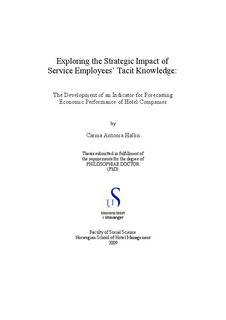| dc.contributor.author | Hallin, Carina Antonia | |
| dc.date.accessioned | 2010-08-12T11:06:54Z | |
| dc.date.available | 2010-08-12T11:06:54Z | |
| dc.date.issued | 2009-10-02 | |
| dc.identifier.citation | Exploring the strategic impact of service employees' tacit knowledge : the development of an indicator for forecasting economic performance of hotel companies / by Carina Antonia Hallin, Stavanger : University of Stavanger, Faculty of Social Science, Norwegian School of Hotel Management 2009 (PhD thesis UiS, no. 77) | en_US |
| dc.identifier.isbn | 978-82-7644-384-4 | |
| dc.identifier.issn | 1890-1387 | |
| dc.identifier.uri | http://hdl.handle.net/11250/185229 | |
| dc.description | PhD thesis in International hotel and tourism management | en_US |
| dc.description.abstract | Background: The concept of knowledge management (KM) and the role of
tacit knowledge as a strategic asset for building competitive advantage
through KM strategies and activities have become increasingly popular over
the last fifteen years - both in management philosophy and in business
practice. Despite the increasing acknowledgement of KM and tacit knowledge
in many sectors, the application and empirical study of KM in the hospitality
sector is however a relatively new phenomenon. Published KM research in the
hospitality sector is thus still scarce, and studies currently remain limited,
inconclusive, and mostly focused on anecdotal and one-off case studies. In a
related vein, there is widespread agreement among scholars in business
management that the construct of tacit knowledge is not sufficiently specified
and that it resists operationalization. Yet, turning to strategic management,
evidence on the operationalization of tacit knowledge does exist. Strategic
management scholars for instance agree that tacit knowledge is both an
intangible asset and a strategic asset, and that intuitive judgments constitute
the vehicle to elicit individual tacit knowledge. Previous studies in the
resource-based view (RBV) tradition and knowledge-based view (KBV)
tradition in strategic management have likewise offered evidence on the
existence of tacit knowledge and intangible assets and their relationship with
economic firm performance. Moreover, behavioral economics offer evidence
that confidence indices, i.e. indices of consumer sentiment based on
consumers’ intuitive judgments about the future, can predict changes in
countries’ GDP.... | en_US |
| dc.language.iso | eng | en_US |
| dc.publisher | University of Stavanger, Norway | en_US |
| dc.relation.ispartofseries | PhD thesis UiS;77 | |
| dc.subject | hoteller | en_US |
| dc.subject | knowledge management | en_US |
| dc.subject | ansatte | en_US |
| dc.subject | strategi | en_US |
| dc.subject | ledelse | en_US |
| dc.subject | kunnskapsledelse | en_US |
| dc.title | Exploring the strategic impact of service employees' tacit knowledge : the development of an indicator for forecasting economic performance of hotel companies | en_US |
| dc.type | Doctoral thesis | en_US |
| dc.subject.nsi | VDP::Social science: 200::Economics: 210::Business: 213 | en_US |
